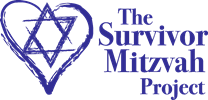Hello, my greatly esteemed ones! No, what I actually want to write is “My dear and nice ones!”
Unfortunately, the war did not spare many of our relatives. My wife and I remain here alone. Only in Tarashcha, where we were born, a nephew remains with his family.
And this little town before the war was almost entirely Jewish, we made up practically half of the population of Jews. There were tradesmen, tailors, barbers, tinsmiths, merchants, and coach drivers.
In our little town there was a synagogue, and Jews went there to pray. My parents went. I remember how proudly I carried my father’s tallis and tefillin. I especially love the holidays. Then, when I became a pioneer, and then a komsomolets, of course I had to stop going to the synagogue. But at home we always kept the Jewish traditions. As a Jewish boy I didn’t feel any kind of oppression amidst the students in the Ukrainian school. My grandfather on my mother’s side was a melamed, and on my father’s side, a watchmaker. And his descendents followed in his footsteps, becoming watchmakers. He had three brothers who became watchmakers, and his sister married a watchmaker. I was born too late to know these grandparents. I carry the name of my grandfather on my father’s side. They called him Tsaddik, and they gave me the name Tsadik. Grandfather was a very capable watchmaker. In Tsarist times the governor of Kiev invited him to travel to Kiev and be his court watchmaker. But he declined, despite the fact that he lived in a lodging that was half-underground. That was how much he loved his native [rodnoy] Tarashcha. I followed after my grandfather and my entire working life after the war was as a watchmaker, until at age 62 my vision forced me to go on pension. And I am very emotionally attached to my family, to my birthplace, and once or twice every year without fail my family travels to Tarashcha, we call on our near and dear ones who went to the other world.
In my time there was no cheder, and I studied in a seven-year Jewish school, and then to a Ukrainian school. Two days after final exams, it was June 22. The beginning of the war. And in the second month of the war they drafted me into the Red Army.
My father died during the time of evacuation to the town of Alma-Ata in 1943. That is in Kazakhstan. At that time I was in that city. As a war invalid, they sent me there after I was released from the hospital. I was on crutches, and now I walk with a cane. Our meeting turned out to be very interesting.
In Russia there is a town called Buguruslan. In this town is located an entire archive of documents on those who were evacuated. And I, still in the hospital, received a reply to my inquiry that my uncle, my father’s brother, was in Alma-Ata. I decided to go to see him. I wrote him a letter, and after being released from the hospital, I set out on the journey to my uncle. Arriving in the town, I got off the train. It was a strange town, I didn’t know anyone, and I could hardly move. I spoke to a woman who, in order not to die of hunger, was selling knishes — piroshki. She handed them all to another woman with the words, “I will accompany him, maybe someone will also accompany my husband to find me.” Her husband was at the front. And then I recognized the voice of my older sister. It turned out that not that long ago my parents had moved to this town. When they gave her my letter to read, she came every day to the station, and ran up to every soldier, in order to meet me. You can imagine how many tears and how much joy, and we were not the only ones crying from joy, everyone who saw us meet was crying. Mama became hysterical when she saw me, and came to her senses only with difficulty. When my father came home and embraced me, I didn’t recognize him. He cried and trembled, right now as I write these lines, there is a lump in my throat from tears.
When I served in the army, we were like one family. There was just one goal, to defeat fascism and bring the Day of Victory.
These days anti-Semitism is increasing more and more. But I do not feel it among simple people, nor among the local authorities. To the contrary, they bow low to our family, they behave to our family with respect. I have written so much, I am afraid I have bored you.
I kiss you firmly, as very near and dear people…and the best wishes of health, health and again health. Again I kiss you. Blessings to you all from God. I wish you all earthly blessings.
The Family G.
Again I give many thanks to you for your letter. My family extends their heartfelt greetings with wishes for health, happiness and new undertakings. With respect and love.
[handwritten: P.S. Thank you very much for your letter and your attention. Yu. N.)

Leave A Comment